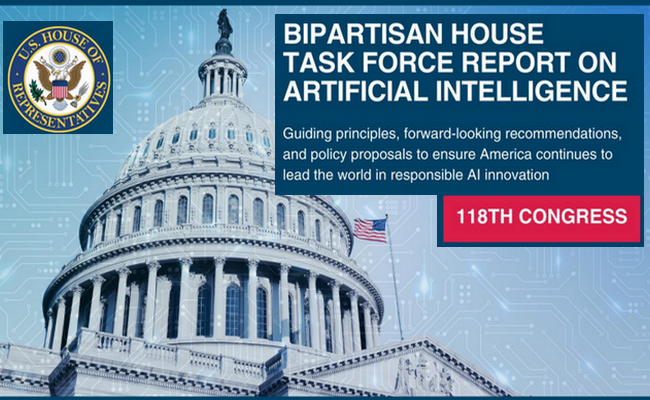SaMedia, Dec. 17— House leaders unveiled a comprehensive bipartisan blueprint Thursday for regulating artificial intelligence, marking Congress’s most significant effort yet to address the opportunities and challenges posed by the rapidly evolving technology.
The 253-page report, produced by the House Bipartisan Task Force on Artificial Intelligence, outlines detailed recommendations across 15 key sectors including national security, healthcare, financial services, and civil rights. The task force, established in February by Speaker Mike Johnson and Democratic Leader Hakeem Jeffries, comprised 24 members equally split between both parties.
“AI has tremendous potential to transform society and our economy for the better and address complex national challenges,” the report states. “From optimizing manufacturing to developing cures for grave illnesses, AI can greatly boost productivity, enabling us to achieve our objectives more quickly and cost-effectively.”
However, the task force also acknowledged significant risks, noting that “AI can be misused and lead to various types of harm” if not properly regulated.
Among the report’s most significant proposals is a sector-specific approach to AI regulation rather than comprehensive federal legislation. “For an agile and focused approach to AI policy, sector-specific regulators within federal agencies and other parts of government should use their existing authority to respond to AI use within their individual domains of expertise and the context of the AI’s use,” the report recommends.
Addressing privacy concerns, the task force suggests exploring new mechanisms for privacy-enhanced data sharing while ensuring existing privacy laws adequately cover AI applications. The report also tackles the emerging challenge of AI-generated content, recommending technical solutions for content authentication and clear liability frameworks.
The framework pays special attention to small businesses, acknowledging their unique challenges in adopting AI technology. Recommendations include providing resources and technical assistance while ensuring regulatory requirements don’t create undue burdens for smaller firms.
In the financial sector, the task force advocates for a principles-based regulatory approach that promotes innovation while maintaining consumer protections. For healthcare, it emphasizes the need for safe and transparent AI implementation while supporting appropriate payment mechanisms for AI-enabled services.
The report also addresses AI’s growing energy demands, recommending investments in infrastructure and efficiency improvements while ensuring costs are fairly distributed among users.
Notably, the task force stopped short of calling for immediate restrictions on open-source AI models, instead recommending continued monitoring while focusing on addressing demonstrable harms rather than speculative risks.
Civil rights advocates will find the report includes strong provisions for preventing discriminatory uses of AI, with recommendations for maintaining human oversight in consequential decisions and empowering regulators with technical expertise to identify bias.
The task force acknowledged that this report is not intended to be the final word on AI policy, identifying several areas for future exploration including export controls, antitrust considerations, and environmental impacts.
Industry reaction has been largely positive, with technology companies praising the balanced approach while civil society groups welcomed the emphasis on protecting rights and promoting equity.
Congressional leaders indicated they will begin drafting legislation based on the task force’s recommendations, though the timeline for specific bills remains unclear. With broad bipartisan support for the framework, observers say this could represent a rare opportunity for significant technology legislation in an otherwise divided Congress.
The report emphasizes that maintaining U.S. leadership in AI development is crucial: “The United States is the global leader in AI research, the number of AI companies, private sector AI investment, and industry adoption of AI. This overwhelming national advantage derives from two of our longstanding strengths: we have cultivated a thriving innovation ecosystem and a flexible sectoral regulatory framework.”
Congressional leaders indicated they will begin drafting legislation based on the task force’s recommendations, though the timeline for specific bills remains unclear. With broad bipartisan support for the framework, observers say this could represent a rare opportunity for significant technology legislation in an otherwise divided Congress.








